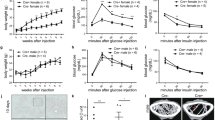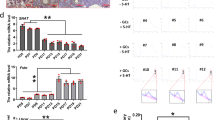Abstract
RECENTLY Evans1 reported the existence of a new pituitary factor, the antagonist, which inhibits follicle development in infantile rats when simultaneously injected with follicle-stimulating extracts from various sources. To avoid misunderstanding, it is proposed to call this factor antifolliculogenic, in contrast with antiluteogenic. At about the same time, Bunde and Greep2 described a regression of persistent corpora lutea in the ovaries of hypophy-sectomized rats by the luteinizing fraction of pituitary extracts.
This is a preview of subscription content, access via your institution
Access options
Subscribe to this journal
Receive 51 print issues and online access
$199.00 per year
only $3.90 per issue
Buy this article
- Purchase on Springer Link
- Instant access to full article PDF
Prices may be subject to local taxes which are calculated during checkout
Similar content being viewed by others
References
Univ. Californ. Publ. Anat., 1, No. 8, 237 (1936).
Proc. Soc. Exp. Biol. and Med., 35, No. 2, 235 (1936).
Author information
Authors and Affiliations
Rights and permissions
About this article
Cite this article
FREUD, J. An Antiluteogenic Factor in the Anterior Pituitary. Nature 139, 880–881 (1937). https://doi.org/10.1038/139880b0
Issue Date:
DOI: https://doi.org/10.1038/139880b0
Comments
By submitting a comment you agree to abide by our Terms and Community Guidelines. If you find something abusive or that does not comply with our terms or guidelines please flag it as inappropriate.



